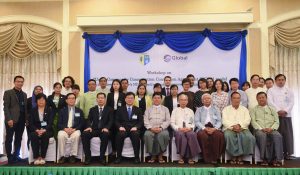Improving & Expanding Conservation Methods in Myanmar
Post-Paris Impact on Developing Countries
Even though the Paris COP 21 Conference was held nearly three years ago, the decisions and commitments made at this summit continue to drive a great deal of current day environmentalism. In fact, for developing countries like Myanmar, the nationally determined contributions (NDC) declared in Paris are both the carrot and the stick for achieving sustainable, low-carbon development.
At present, the possibility of Myanmar achieving its NDCs is questionable: increasing development will lead to increased electricity demand but a large amount of power is still coming from non-renewable sources. Furthermore, the tasks of reducing rural Myanmar’s reliance on non-renewable energy and making these communities more sustainable both pose significant challenges. Finally, the push for development is mounting pressure on Myanmar’s forest resources.
GEI Conservation Workshop in Myanmar
In order to share an experience as well as methods for closing the gap between the traditional development models and necessary improved methods, the Global Environmental Institute and Myanmar Forest Institute (FRI) co-hosted a 1-day seminar on community conservation methods in Myanmar’s capital city of Nap Pyi Taw, on June 6, 2018. Attended by Government officials from China and Myanmar as well as NGOs and research institutes from around Asia and the world, the workshop was titled “Using Community Conservation Concession Agreement (CCCA) model to achieve Myanmar’s NDC Objectives and to Improve Community Livelihoods.”
Specific notable attendees include: Ministry of Natural Resources and Environmental Protection of Myanmar; Myanmar Ministry of Agriculture, Livestock and Irrigation; Science and Technology Strategy Consultation Institute of Chinese Academy of Sciences; Southeast Asian Biodiversity Research Center of Chinese Academy of Sciences (CAS-SEABRI); Myanmar Ecological Conservation and Community Development Initiative (ECCDI); Community Development Action (CDA), Myanmar Forest Association (MFA), Myanmar Environment Institute (MEI); and Conservation International (CI); World Conservation Union (IUCN); European Forest Institute (EFI).
The Community Conservation Concession Agreement (CCCA), which was first developed in Peru, was the main focus of the workshop. In fact, GEI was the first organization to adapt and introduce the CCCA to China in 2014. Then in 2016, we further expanded the methodology to several of Myanmar’s key biodiversity areas. The CCCA aims to coordinate the aims of local people and government officials for conservation and development by supporting the locals to get involved in the conservation practices.
At the meeting, the participants and experts reported and introduced the Myanmar Forestry NDC Target, the Myanmar Community Forestry Plan, and the current protocol protection community pilot project in Myanmar, and assisted Myanmar in how to use the CCCA method to meet the goal.
Highlights from the workshop:
- Dr. Nyi Nyi Kyaw, Director of the Forestry Department of the Ministry of Natural Resources and Environmental Protection of Myanmar
Dr. Nyi Nyi Kyaw delivered a welcome speech at the meeting, introducing the current state of forest resources in Myanmar and the NDC forestry target. Dr. Nyi Nyi Kyaw mentioned that in 2030, the protected forests of Protected Forest and the Protected Public Forest in Myanmar reached 30% and the protected area of Myanmar reached 10%. He emphasized that community participation in forest protection and the balance of protection and development will be critical moving forward.
- Dr. Wang Yi, deputy director, researcher and doctoral supervisor of the Institute of Science and Technology Policy and Management of the Chinese Academy of Sciences,
Dr. Wang Yi introduced the concept of “ecological civilization” and other related reforms happening currently in China. During this discussion he also affirmed the results of GEI’s long-term work in Myanmar and expressed hope that the Myanmar government can work together with the Chinese government, the social organizations of the two countries as well as international agencies to help Myanmar achieve its NDC goals.
In addition, Dr. Zhang Ji-qiang, Chairman of the GEI Steering Committee, Dr. Peng Kui, Manager of Ecological Protection and Community Development Project, Dr. Thaung Naing Oo, Director of FRI, Dr. Ei Ei Swe Hlaing, Assistant Director, and several other representatives from Myanmar NGOs introduced their respective perspectives on the CCCA mechanism. A common theme throughout all of the discussions was the importance of cooperation amongst various stakeholders.
Following the speeches, the participants enjoyed a panel discussion featuring representatives from FRI, ECCDI, GEI, CI, and CAS-SEABRI, who discussed various plans and resources available to assist Myanmar in achieving NDC goals.
In addition to analyzing potential funding and technical support, GEI developed a “three-part” program to promote the CCCA method Myanmar: he first phase was to complete a community pilot project; the second phase is for GEI and four Myanmar NGOs to create partnerships to support capacity building training to expand the CCCA and its funding mechanisms across Myanmar; and finally, in the third stage, GEI will cooperate with the Myanmar Forestry Department to promote the protocol protection model to the whole country through the formulation of strategic planning and legal framework.


